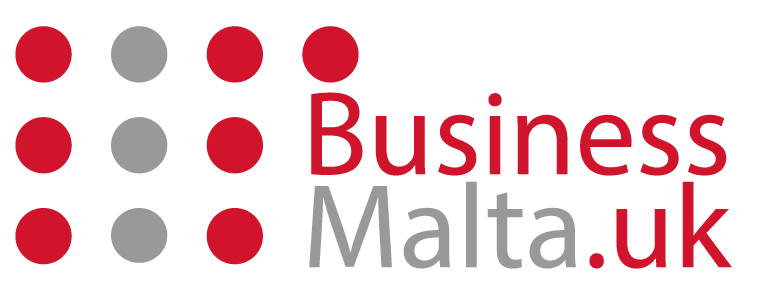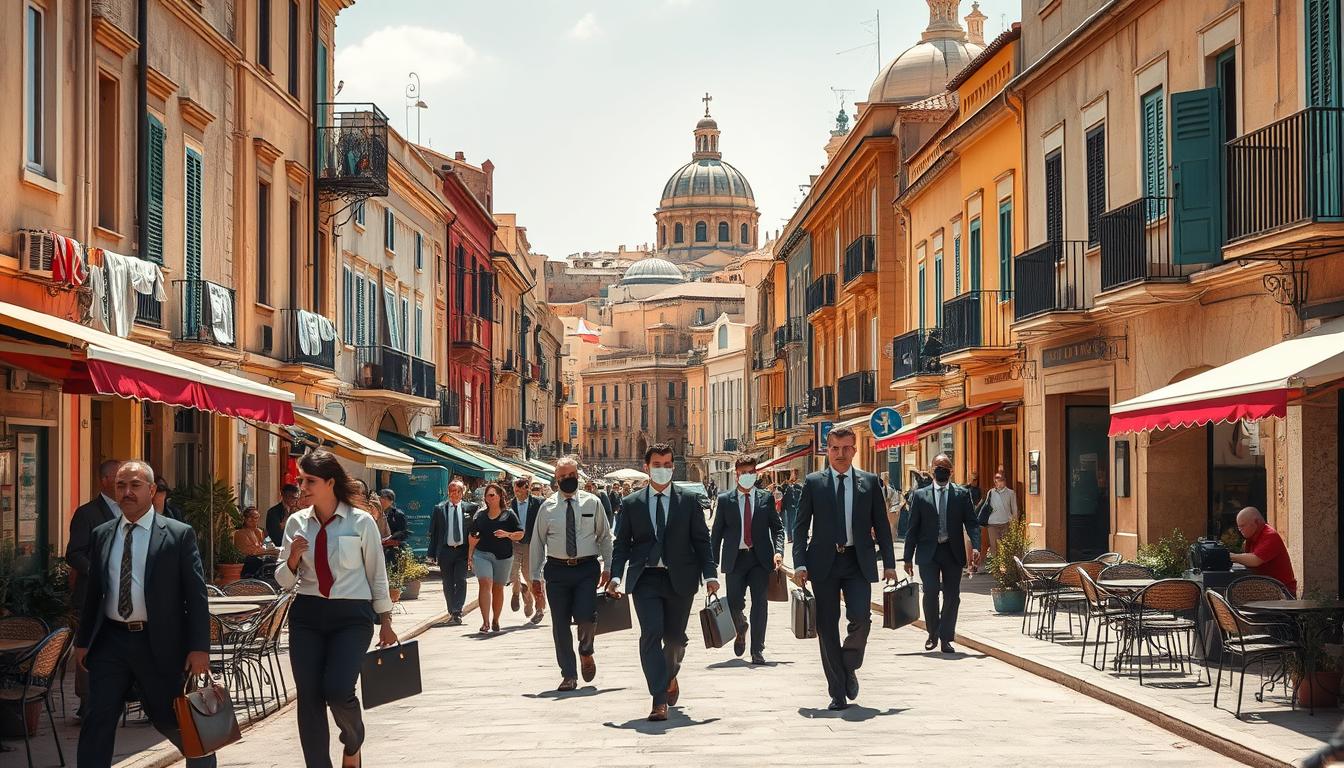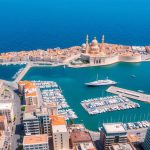The work culture in Malta is a mix of history and location. It’s shaped by Malta’s rich past and its spot at the crossroads of many cultures. We’ll look into how these elements affect business and work relationships in Malta.
We’ll dive into the traits, expectations, and hurdles of the Maltese work scene. This will help both local and international workers understand this lively environment better.
Overview of Malta’s Work Culture
Malta’s work culture is a mix of old and new. British rule brought a formal way of doing business. The Mediterranean location added Italian customs and traditions. This blend creates a special work atmosphere.
Looking at today’s work scene, Malta is changing fast. Global trends and new tech are making the workplace more diverse and flexible. This mix of old and new makes Malta’s work environment unique.
Key Characteristics of Work Culture in Malta
The work culture in Malta focuses on a healthy work-life balance. This is not just a trend but a key principle in business. It leads to happier employees who value their personal time and family.
We will look at how relationships in Maltese workplaces help create a great work environment.
Emphasis on Work-Life Balance
In Malta, work-life balance is a top value in many industries. Employers let staff keep up with personal life while doing their job. This balance boosts productivity and happiness.
Things like long lunch breaks and shorter weeks help achieve this balance. This makes the workforce more engaged and happy.
Importance of Interpersonal Relationships
Maltese workplaces value strong relationships. These relationships go beyond work and create a community feeling. This helps in teamwork and solving problems together.
Trust and support are key. This makes employees feel valued and motivated to do their best. It leads to success for everyone.
Regular Work Hours and Practices
In Malta, a typical work week is from Monday to Friday. Most businesses open from 8:30 AM to 5:30 PM. This schedule helps employees balance work and personal life.
Typical Work Week in Malta
Malta’s work hours include a one-hour lunch break at midday. This break is essential for employees to rest and refocus. The five-day workweek is common, ensuring consistency in Malta’s business world.
Flexibility in Work Schedules
Workplaces are changing, with more flexible hours becoming common. Many companies now offer schedules that fit individual needs. This approach helps both employees and employers, allowing for better work-life balance.
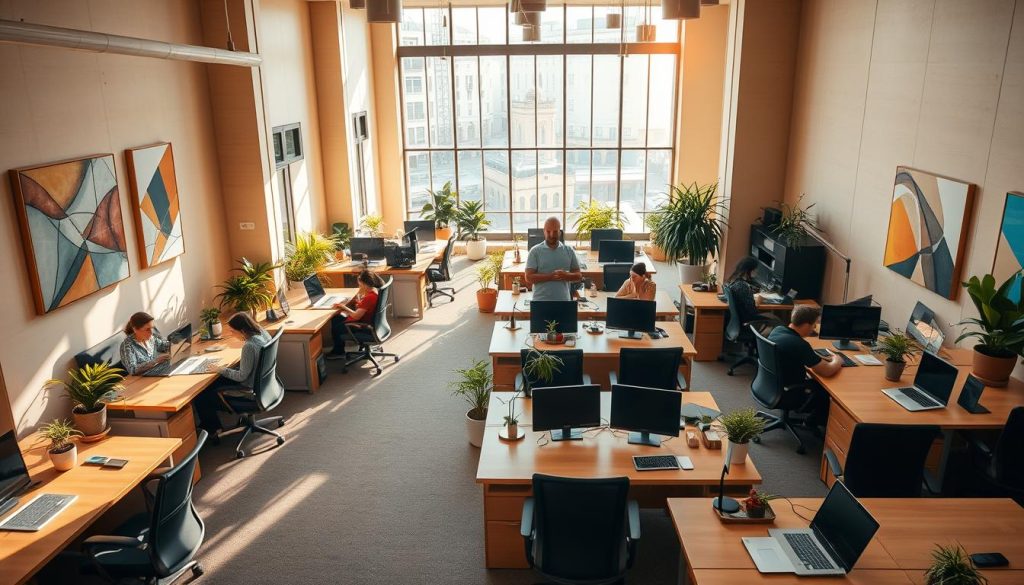
Office Dynamics and Hierarchies
The way offices work in Malta shows both old and new ways of doing things. This is seen in how they set up their workplace hierarchy. Companies usually have a clear structure, but they also value open communication. This mix helps them succeed in Malta’s busy business world.
Workplace Hierarchies in Maltese Companies
In Maltese offices, you’ll find a clear hierarchy with defined roles. Most places have a semi-flat structure, which encourages teamwork. Even though managers make big decisions, they listen to everyone’s ideas. This way, everyone feels heard and helps shape the company’s goals.
Approach to Leadership and Management Styles
In Malta, leaders like to work together and listen to their teams. They focus on supporting their staff, which makes people more motivated and loyal. This approach helps everyone work towards the same goals, creating a strong team spirit.
Professional Etiquette and Behaviour
In Malta, professional etiquette is a mix of formality and friendliness. This creates a space where colleagues can talk openly and respect each other. It’s key to understand how people communicate at work to get along well.
Communication Styles in the Workplace
Maltese communication at work can be direct or diplomatic. Some talks are straight to the point, while others are more subtle. Knowing these styles helps build good relationships with colleagues and clients.
Finding the right balance between being clear and tactful is important. It helps create positive work environments. Being mindful of how you communicate helps you connect better with others.
Dress Code and Professional Appearance
The dress code in Malta is smart casual. It shows you’re professional but also lets you express yourself. While business clothes are used in formal situations, casual outfits are okay for everyday work.
Wearing the right clothes shows respect for your job and your style. It can also make a good first impression and improve how people work together.
Role of Networking in Malta
Networking in Malta is key for professional growth in a small market. Personal connections help bridge to business chances. They aid both individuals and companies in growing their influence.
Importance of Professional Connections
In Malta, professional ties are vital for success. Many businesses rely on word-of-mouth and personal referrals. This approach builds trust and teamwork among local firms.
It’s important to keep and grow these connections. Opportunities often come from within these networks. This shows how important personal relationships are in Malta’s business world.
Networking Events and Initiatives
Malta hosts many networking events for professionals. These include the Malta Chamber of Commerce meetings and workshops for specific sectors. They encourage people to work together and share ideas.
By going to these events, we meet different professionals. This lets us learn from each other and explore new ideas. Programs like mentorship and business forums also help share knowledge and support each other.

Challenges Facing Maltese Employees
Looking at the job scene in Malta, we see many challenges. The economy has changed, affecting jobs, mainly for young and older workers. It’s important for us to find a way to mix old values with new ways of working.
Unemployment Trends and Concerns
Unemployment in Malta is a big worry. We’ve seen more jobless people in certain age groups. This shows we need to act fast. Some jobs are hard to find, making it tough for people looking for work.
Balancing Tradition and Modern Expectations
We’re caught between keeping Maltese traditions and adopting new work styles. Employees are under pressure to be modern while staying true to their roots. Finding a balance between these is a big challenge, leading to talks about keeping our culture alive in a changing world.
| Age Group | Unemployment Rate (%) | Primary Concerns |
|---|---|---|
| 15-24 | 20% | Lack of experience, high competition |
| 25-54 | 8% | Job satisfaction, career growth |
| 55+ | 12% | Age discrimination, skill gaps |
The Evolution of Remote Work in Malta
The world of work has changed a lot in recent years, thanks to remote work in Malta. The pandemic made companies quickly adopt flexible work options. This change has helped transform company culture.
Now, companies aim to support both remote and in-person work. They see the benefits of hybrid work models.
Impact of Remote Work on Company Culture
Remote work in Malta has led to a more inclusive company culture. Teams can work well together, even from different places. This has built trust and engagement among team members.
Remote work has also made companies focus more on results than office hours. This has created a space where everyone can be productive, no matter where they are.
Hybrid Work Models in Popularity
Hybrid work models are becoming more popular as companies adjust to the new normal. These models let employees work from home some days and come to the office others. Our research shows that these models can make employees happier and more likely to stay.
Companies in Malta are starting to use these models to attract the best talent. They want to keep the good parts of their company culture.
| Feature | Remote Work | Hybrid Work |
|---|---|---|
| Flexibility | High | Moderate to High |
| In-Person Collaboration | Minimal | Regular |
| Company Culture Engagement | Low | Enhanced |
| Employee Satisfaction | Moderate | High |
Friendliness and Hospitality in Maltese Workplaces
Maltese workplaces are known for their friendliness and hospitality. These values are part of the nation’s culture. This warmth helps create a team spirit and encourages collaboration.
It’s important to understand how to build rapport at work in Malta. Strong relationships between colleagues can boost job satisfaction and productivity.
Building Rapport with Colleagues
Building friendships at work is a big part of Maltese culture. Employees take time to get to know each other, whether it’s during coffee breaks or team events. This helps create a supportive atmosphere where everyone feels valued.
This friendly setting is key for effective communication. It improves teamwork and collaboration.
Work Culture in the Context of Tourism
Tourism has a big impact on work culture in Malta. The tourism sector is very important, so many organisations focus on excellent customer service. This service is known for being as warm as Maltese hospitality.
Employees learn to handle different interactions and adapt their communication. This skill is useful for tourists and makes the workplace feel like a community.
Understanding Multiculturalism in Malta
Malta is a mix of many cultures, which shapes our work life. This mix brings different views that boost creativity and innovation. In today’s world, having diverse teams helps solve problems better and leads to success.
The Influence of Diversity on Workplace Dynamics
Adding multiculturalism to work makes teams lively and dynamic. A diverse team works better together, leading to more innovation. Studies show that diverse teams do better, keeping employees happy and improving job satisfaction.
Inclusion and Equal Opportunity Efforts
Companies in Malta work hard to make everyone feel valued. They focus on equal chances for all, helping minority groups. This not only makes employees happier but also makes the company better, as diverse teams often do better.
| Aspect | Impact of Diversity | Inclusion Efforts |
|---|---|---|
| Creativity | Encouraged through various perspectives | Workshops and training for inclusivity |
| Problem-Solving | Innovative ideas from diverse backgrounds | Feedback mechanisms for all employees |
| Employee Retention | Higher retention rates observed | Mentorship programmes for underrepresented groups |
By using Malta’s multiculturalism, businesses can make places where everyone does well. Following these ideas helps companies succeed and build strong communities.
Regulatory Environment and Compliance
It’s key to know the rules in Malta for both workers and bosses. Knowing the laws helps everyone do their job right. This part talks about important rules for work in Malta, like laws for jobs and why following them matters.
Key Employment Laws in Malta
Malta’s job laws cover things like work hours, what workers can expect, and keeping everyone safe. These rules help keep work fair and safe for everyone. Here are some main points:
- Working Hours: Most people work up to 40 hours a week.
- Leave Entitlements: Workers get time off and public holidays.
- Termination of Employment: There are rules for firing workers fairly.
Importance of Regulatory Compliance
Following the rules in Malta is important for a good work place. It makes sure workers are treated right and get what they deserve. For bosses, following the laws helps keep their business good and safe. Breaking the rules can lead to legal trouble and harm a company’s image. So, it’s important to know and follow Malta’s work laws to do well.
The Role of Technology in Work Culture
Technology is key in shaping Maltese work culture. It changes how we talk, work together, and do tasks. The digital transformation in Malta is making big changes. It’s helping businesses work better and try new things.
Digital Transformation in Maltese Businesses
Many Maltese businesses have started using new technology. They use cloud computing, artificial intelligence, and data analytics. This helps them work smarter and be more creative.
Importance of IT Services in the Workplace
IT services are very important in today’s work world. Good IT support keeps businesses running smoothly. It helps keep data safe, makes systems reliable, and boosts employee work.
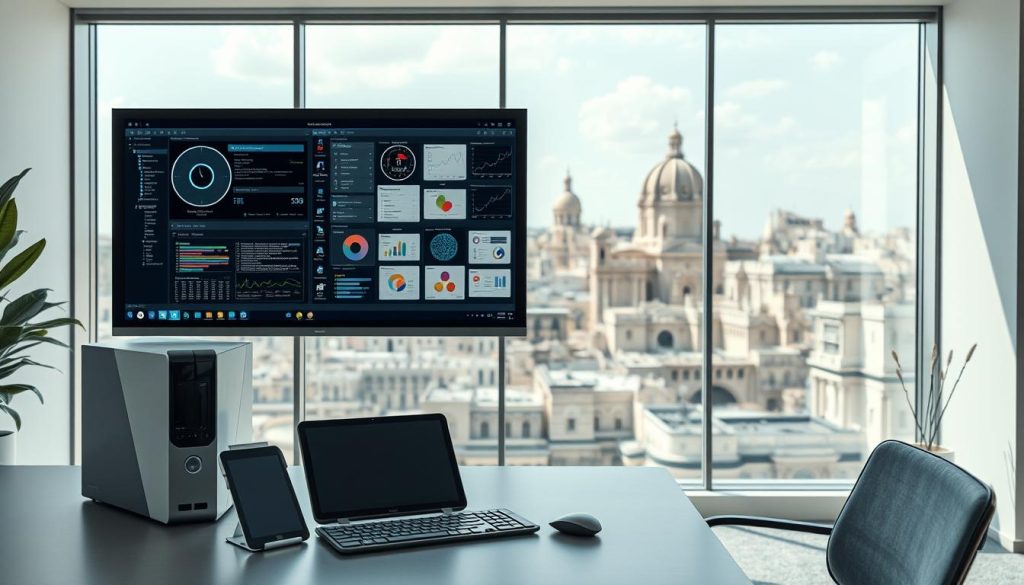
Professional Development and Lifelong Learning
In Malta’s dynamic work scene, the push for professional growth is stronger than ever. People looking to move up in their careers need to seek out training that boosts their abilities. Lifelong learning in Malta is key to creating a workforce ready for change and new challenges.
Opportunities for Training and Development
There are many ways to grow professionally. You can find vocational training or special courses at educational institutions. Companies also work with training providers to keep their staff up-to-date and competitive.
Importance of Continuous Skill Enhancement
Staying current with skills is essential in today’s fast world. Not updating your skills can hold you back in your career. By focusing on lifelong learning in Malta, we become more adaptable and ready for what’s next. This benefits us personally and helps our employers too.
LerriHost’s Services Supporting Work Culture
LerriHost services Malta are key in building a strong work culture. They help foreign investors a lot. We make setting up a business in Malta easy for our clients.
Company Formation and Its Impact
Setting up a company is vital for new investors. It lets businesses run legally and affects their success. LerriHost offers custom solutions for foreign companies. We make sure they follow Maltese laws.
This helps new businesses thrive. It makes the work culture better.
Nominee Services for Foreign Investors
Nominee services help foreign investors in Malta. With LerriHost, clients can keep control of their business. They also follow local laws easily.
This service makes investing in Malta easier. It helps investors fit in well in Malta’s work scene.
Financial Services and Their Importance
In today’s fast-paced economy, financial services in Malta are key for businesses. They help keep money flowing and operations running smoothly. We’ll look at banking in Malta and the latest payment solutions for businesses.
Banking and Payment Processing in Malta
The banking scene in Malta has changed a lot. It now supports both local and international businesses well. With many banks around, companies can find the right partner for growth.
Malta also offers top-notch payment solutions. These include online payment gateways and merchant services for digital transactions. This makes payment processes smoother, improving cash flow and customer happiness.
Financial Services Overview by LerriHost
LerriHost leads in financial services in Malta. We understand the local market well and offer custom solutions. Our services go beyond basic banking, helping businesses with innovative payment solutions.
We also provide advice to help clients understand Malta’s financial scene. This lets them focus on growing their business.
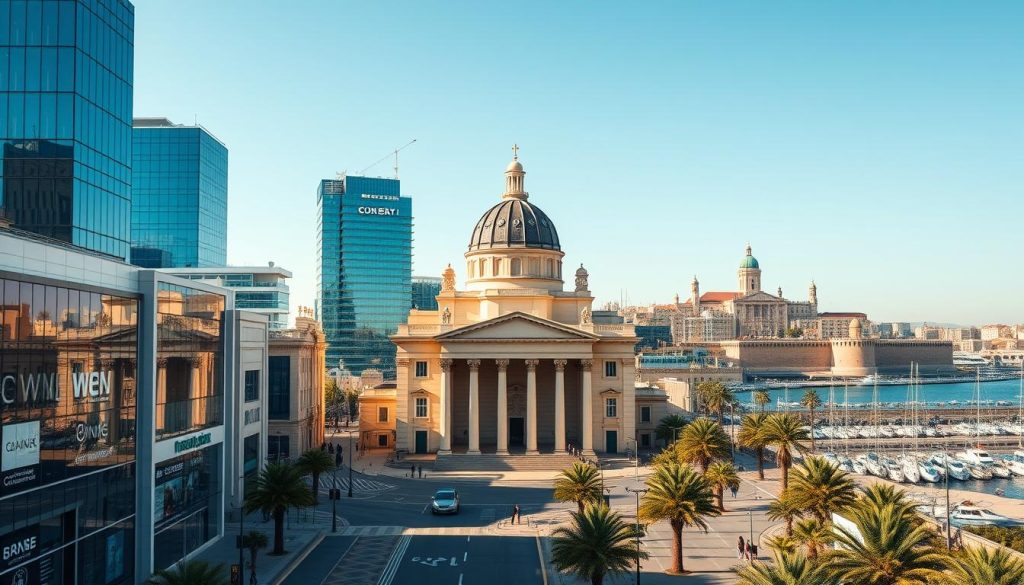
Contact Us for Further Information
If you’re looking into Malta’s work culture or need business support, we’re here for you. Our team at LerriHost is ready to offer valuable insights. We can help you understand the business environment in Malta.
Reach Out for Our Expertise
Knowing the local work culture is key to success. Whether you’re starting a business or need help with compliance and networking, we’re here. Just reach out, and we’ll support your journey.
Contact Details for LerriHost
For any inquiries, call us at 07538341308. We’re excited to talk about how we can help your business grow in Malta.
